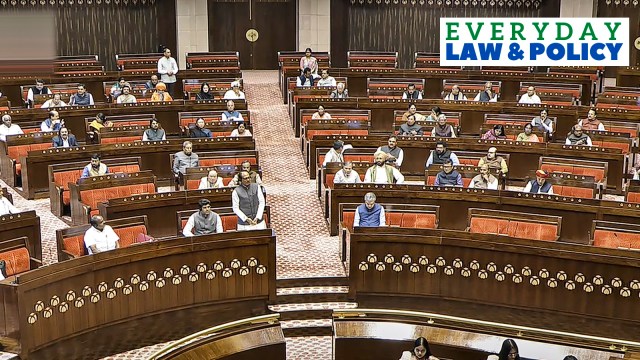Who carries out these checks in Parliament, and why? What happens during these checks, and what do the security personnel look for?

Members in the Rajya Sabha during the Winter session of Parliament, in New Delhi, Friday, Dec. 6, 2024. (PTI Photo)
Rajya Sabha Chairman Jagdeep Dhankhar announced in the House on Friday (December 6) that a wad of currency notes had been “recovered from seat number 222, presently allotted to [Congress MP] Abhishek Manu Singhvi”, during the routine “anti-sabotage” security check on December 5.
What is this “anti-sabotage” security drill, who conducts it and how, and why?
When and where does the anti-sabotage security drill happen in Parliament?
Anti-sabotage teams of the Central Industrial Security Force (CISF) carry out checks every day when Parliament is in session. The teams have sniffer dogs who are especially trained to detect explosives.
For around three hours every morning, every seat in both Houses is checked. Parliament staff withdraw, and the chamber is handed over to the CISF security team.
And what does the drill entai
The teams look for suspicious objects, signs of fresh human intervention in the area of duty, or broadly anything that is unusual. If the team detects anything suspicious, the escalation matrix is through the unit in-charge, and his superior officer.
Since when have these drills been carried out?
The CISF took over all counterterrorism and anti-sabotage security duties at the Parliament Complex in May 2024 after around 1,400 personnel of the Central Reserve Police Force (CRPF) were withdrawn from these duties. A contingent of 3,317 CISF personnel are currently deployed to secure both the old and new Parliament buildings and other structures in the Complex.
Before the CISF moved in, a joint team of three agencies, the CRPF, Delhi Police, and Parliament’s own Security Services, carried out the anti-sabotage security drills in the building. The CRPF and Delhi Police have now been pulled out of the Complex, and the Parliament Security Services (PSS) staff have been redeployed entirely to administrative work.
So why was Parliament security handed over to the CISF?
The trigger for the change was a serious breach of security that took place at the Complex on December 13, 2023.
Two individuals jumped into the Lok Sabha chamber from the public gallery during Zero Hour, and released canisters of yellow smoke and shouted slogans before being overpowered by MPs. Around the same time, two other persons released similar canisters of coloured smoke and shouted slogans outside the building.
Although the breach took place on the anniversary of the 2001 terrorist attack on Parliament, there was no terrorism angle to last year’s incident.
A committee under the chairmanship of the CRPF Director General was set up to look into the overall security of the Parliament Complex, and make suitable recommendations. The CISF took full charge of the Parliament Complex on May 20.